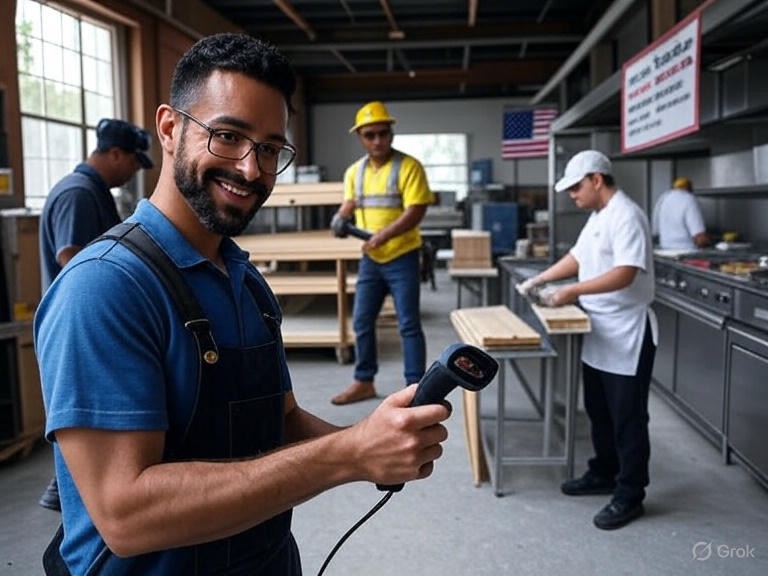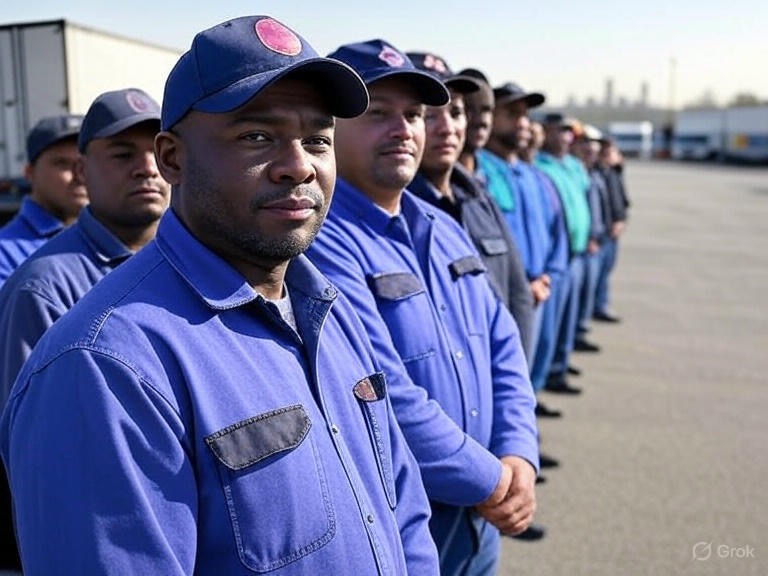The United States’ $21 trillion economy relies heavily on unskilled labor to support industries like hospitality, agriculture, construction, and retail, which collectively employ over 30 million workers.
Despite this, the U.S. faces a persistent shortage of unskilled workers, with the Bureau of Labor Statistics (BLS) reporting 2.5 million unfilled low-skill jobs in 2024.
This gap, driven by an aging workforce, high turnover, and post-COVID labor market shifts, has led employers to increasingly offer visa sponsorship to foreign workers through the H-2B temporary non-agricultural visa program.
Unskilled jobs, requiring minimal education or experience, provide wages of $28,000-$45,000 annually and opportunities in high-demand regions like Florida, California, and Texas.
This guide explores unskilled jobs in the USA with visa sponsorship in 2025, detailing the job market, visa processes, requirements, application strategies, benefits, responsibilities, and challenges.
Drawing on data from the BLS, U.S. Department of Labor (DOL), U.S. Citizenship and Immigration Services (USCIS), and industry sources, it provides a roadmap for international workers to secure roles and thrive in America’s diverse economy.
Unskilled jobs, such as cleaning, dishwashing, farm work, and retail, are critical for maintaining essential services, from hotel operations to food production.
Employers like Marriott, Walmart, and Tyson Foods are actively recruiting foreign workers to address shortages, with the H-2B visa facilitating legal employment for up to 9 months, extendable to 3 years.
With a 2025 cap of 66,000 H-2B visas plus a supplemental 64,716, these opportunities are accessible to workers from countries like Mexico, Jamaica, and the Philippines.
This article equips aspiring workers with the tools to navigate the job market, obtain sponsorship, and succeed, whether cleaning guest rooms in Miami or harvesting crops in California.
The Unskilled Job Market in the USA 2025
Overview and Trends
The U.S. low-skill labor market is a vital component of its economy, supporting industries that generate $4.5 trillion in annual revenue. The BLS projects 1.2 million annual openings for unskilled roles through 2032, driven by:
- Labor Shortages: 65% of employers in hospitality, agriculture, and retail report staffing gaps, per the National Federation of Independent Business (NFIB, 2024).
- Economic Recovery: Post-COVID demand for services, with restaurant sales reaching $1.1 trillion and tourism attracting 70 million visitors in 2024 (U.S. Travel Association).
- Aging Workforce: 20% of unskilled workers are over 55, accelerating retirements.
- Seasonal Demand: Peak seasons (e.g., summer tourism, fall harvests) require temporary workers.
- E-commerce Growth: $1.3 trillion in online sales increases demand for warehouse and delivery workers.
High-Demand Roles and Locations
Unskilled roles include:
- Cleaners/Housekeepers: Clean hotels, offices, and homes, handling tasks like vacuuming and sanitizing (SOC 37-2012).
- Dishwashers: Maintain kitchen hygiene in restaurants and hotels (SOC 35-9021).
- Farm Workers: Harvest crops, plant seeds, and tend livestock (SOC 45-2092).
- Retail Associates: Stock shelves, assist customers, and handle transactions in stores like Walmart (SOC 41-2031).
- Construction Laborers: Support building projects with tasks like digging and material handling (SOC 47-2061).
- Warehouse Workers: Pack, sort, and load goods for companies like Amazon (SOC 53-7065).
Top states for visa-sponsored unskilled jobs:
- Florida: 18,200 H-2B certifications in 2023, with roles in Miami, Orlando, and Tampa.
- California: 15,000 certifications, centered in Los Angeles, Fresno, and San Diego.
- Texas: 12,500 certifications, with demand in Houston, Austin, and Dallas.
- Nevada: High wages ($30,000-$42,000) in Las Vegas.
- New York: Roles in New York City and Buffalo.
Wages and Employers
- Median Wage: $31,920/year ($15.35/hour) for cleaners; $30,180/year for farm workers; $34,110/year for retail associates (BLS, 2024).
- Entry-Level: $28,000-$35,000; experienced workers earn $35,000-$45,000 with overtime.
- Overtime/Tips: Overtime (1.5x) adds $2,000-$5,000; tips in hospitality add $1,000-$3,000.
- Major Employers:
- Hospitality: Marriott, Hilton, and IHG, sponsoring cleaners and dishwashers.
- Agriculture: Tyson Foods, Driscoll’s, and Grimmway Farms, hiring farm workers.
- Retail: Walmart, Target, and Dollar General, recruiting associates.
- Construction: Turner Construction and Bechtel, employing laborers.
- Warehousing: Amazon, FedEx, and UPS, hiring packers.
- Recruitment Agencies: Alliance Abroad, Labor Finders, and H2B Programs, placing H-2B workers.
Job boards like Indeed (500 visa-sponsored unskilled jobs), SimplyHired (300 jobs), and CoolWorks (150 jobs) list opportunities, with hiring peaks in spring (March-May) and fall (September-November) for seasonal roles.
Basic English is often required for safety and communication, though some employers accept limited proficiency in diverse regions. The next section details visa options.
Visa Options for Unskilled Jobs
Foreign workers primarily rely on the H-2B visa for unskilled roles, as the EB-3 visa is less common for low-skill positions. Below is an overview based on USCIS and DOL guidelines.
H-2B Visa (Temporary Non-Agricultural Worker)
- Purpose: For temporary, non-agricultural roles when U.S. workers are unavailable, such as seasonal or peak-load jobs (e.g., summer hotel cleaning, fall harvests).
- Cap: 66,000 visas annually, with a 64,716 supplemental allocation in FY 2025, including 20,000 for nationals of El Salvador, Guatemala, Honduras, Haiti, Colombia, Ecuador, and Costa Rica, exempt from returning worker requirements.
- Duration: Up to 9 months, extendable to 3 years, with a 3-month return home required.
- Eligibility: Job offer from a DOL-approved employer, country eligibility, and intent to return.
- Process:
- Employer secures Prevailing Wage Determination (PWD) to ensure wages meet local standards (e.g., $15/hour in Florida).
- Employer conducts a labor market test and files for Temporary Labor Certification (Form ETA-9142B).
- Employer submits Form I-129 ($1,500 fee, employer-paid).
- Worker applies for an H-2B visa at a U.S. embassy/consulate.
- Processing Time: 3-6 months (2-4 weeks for visa, 60-90 days for I-129).
- Benefits: Employer reimburses $195 visa fee, travel costs ($500-$2,000), and subsistence. FY 2025 portability allows employer switches.
- Limitations: Temporary; no direct path to permanent residency.
H-2A Visa (Temporary Agricultural Worker)
- Purpose: For agricultural roles like farm work, often seasonal (e.g., fruit harvesting).
- Cap: No numerical limit, with 370,000 certifications in 2024.
- Eligibility: Job offer from a DOL-approved employer, country eligibility.
- Process: Similar to H-2B, with PWD, labor certification, and Form I-129.
- Duration: Up to 10 months, extendable to 3 years.
- Benefits: Employer-provided housing and meals; reimbursed travel.
- Limitations: Limited to agriculture; temporary.
EB-3 Visa (Employment-Based Permanent)
- Purpose: For “other workers” with a job offer, leading to permanent residency, though rare for unskilled roles.
- Eligibility: Job offer, high school diploma or equivalent, and 1-2 years of experience.
- Process:
- Employer obtains labor certification (ETA-9089A) via PERM test.
- Employer files Form I-140 ($700 fee).
- Worker files Form I-485 or consular processing for a green card.
- Processing Time: 12-36 months, with backlogs for countries like Mexico and Philippines.
- Benefits: Permanent residency and family reunification.
- Limitations: Few employers sponsor EB-3 for unskilled jobs due to cost.
Other Considerations
- J-1 Visa: Used for cultural exchange, not suitable for unskilled roles.
- H-1B Visa: Inapplicable, as unskilled jobs lack degree requirements.
- Job Seeker Visa: Not available; a job offer is mandatory.
The H-2B is the primary pathway for non-agricultural roles, with 80% of visa-sponsored unskilled jobs using it, per DOL data. H-2A is key for farm work. The next section outlines worker requirements.
Requirements for Foreign Workers
To secure visa-sponsored unskilled jobs, foreign workers must meet USCIS, DOL, and employer criteria, ensuring suitability and compliance.
- Country Eligibility:
- H-2B/H-2A: Applicants must be from eligible countries (e.g., Mexico, Jamaica, Philippines, or the 20,000-visa allocation countries for H-2B). The 2025 Federal Register lists over 80 nations.
- EB-3: No country restrictions, but backlogs apply for Mexico, Philippines, and India.
- Job Offer: A formal offer from a U.S. employer with approved labor certification, specifying job duties (e.g., cleaning, harvesting).
- Education and Training:
- No formal education required; a high school diploma strengthens EB-3 applications.
- No certifications needed, but 0-1 year of relevant experience (e.g., cleaning, farm work) is preferred.
- Employers often provide on-the-job training (e.g., sanitation for cleaners, safety for laborers).
Experience:
- H-2B/H-2A: 0-1 year of related work or transferable skills (e.g., hospitality, manual labor).
- EB-3: 1-2 years, verified by references.
- Evidence includes employer letters or work certificates.
- English Proficiency: Basic English (IELTS 4.0 equivalent) for safety and communication in most roles. Employers assess during interviews; consular officers verify. Limited proficiency is acceptable for farm work or diverse regions like Miami.
- Intent to Return (H-2B/H-2A): Proof of home country ties (e.g., family, property) to ensure return after visa expiration.
- Health and Background:
- Clean criminal record (police certificate from home country and residences over 6 months).
- Health exams, including TB testing and vaccinations (e.g., Hepatitis A, COVID-19), costing $100-$300.
- Physical ability to perform tasks (e.g., stand for 8 hours, lift 25-50 pounds).
- Returning Worker Status (H-2B): Prior H-2B status in FY 2022-2024 for supplemental visas, except for the 20,000-visa allocation.
A valid passport and initial financial stability are required, though employers reimburse costs like travel ($500-$2,000) and visa fees ($375-$395). Preparing references early enhances applications.
The Job Search and Visa Application Process
Securing a visa-sponsored unskilled job involves job hunting, application preparation, and visa processing. Below is a detailed roadmap for 2025.
Step 1: Research and Find Jobs
- Job Portals:
- Indeed: 500 visa-sponsored unskilled jobs, with filters for “H-2B visa” or “H-2A.”
- SimplyHired: 300 jobs, including roles at Marriott and Tyson Foods.
- CoolWorks: 150 jobs, focusing on seasonal hospitality and agriculture.
- Hcareers: 100 jobs for cleaners and dishwashers.
- SeasonalJobs.dol.gov: 200+ H-2B/H-2A jobs.
- Recruitment Agencies:
- Alliance Abroad: Places H-2B workers in hospitality and retail.
- Labor Finders: Connects workers with construction and warehouse employers.
- H2B Programs: Specializes in visa-sponsored roles.
- Global Employment Solutions: Focuses on agriculture and hospitality.
- Fees ($500-$2,000) are often employer-paid.
- Employer Websites: Marriott, Walmart, Tyson Foods, Amazon, and Turner Construction post sponsored roles.
- Networking: Join LinkedIn groups (“Unskilled Jobs USA”), expat forums (Reddit’s r/immigration), and virtual job fairs by CoolWorks or NFIB.
Step 2: Prepare Application Materials
- Resume: Highlight relevant experience, physical stamina, and reliability. Include visa eligibility (e.g., “Eligible for H-2B sponsorship”).
- Cover Letter: Tailor to the employer, emphasizing work ethic (e.g., “I am a dedicated worker with 1 year of cleaning experience, seeking H-2B sponsorship”). Keep it concise.
- Documents: Provide references, work certificates, and translated diplomas ($50-$100/document), if applicable.
Step 3: Apply and Interview
- Applications: Submit via portals or employer websites. Follow up within 7-10 days.
- Interviews: Expect questions on work ethic (e.g., “How do you handle repetitive tasks?”) and visa knowledge (e.g., “Are you familiar with H-2B requirements?”). Practice basic English responses. Remote interviews require stable internet; in-person interviews need casual, clean attire (e.g., polo shirt).
- Job Offer: The employer provides a contract, initiating the visa process.
Step 4: Apply for H-2B/H-2A Visa
- Employer Steps:
- Secure PWD (2-4 weeks).
- Obtain labor certification (30-60 days).
- File Form I-129 (60-90 days).
- Worker Steps:
- Submit Form DS-160 at a U.S. embassy/consulate, paying $195 visa fee and $185-$205 processing costs.
- Provide:
- Passport and photos
- Form I-797 (I-129 approval)
- Job offer letter
- Proof of home ties
- Criminal record certificate
- Attend consular interview (5-10 minutes) on job details and intent to return (2-4 weeks processing).
- Entry: Enter the U.S. within 10 days of job start.
Step 5: Start Employment
- Employers provide training (e.g., safety, equipment use) and orientation. Begin work within 10 days.
An immigration attorney ($1,500-$3,500) or agency like Alliance Abroad can streamline the process, though self-application is feasible.
Benefits and Responsibilities
Visa-sponsored unskilled jobs offer notable benefits, balanced by responsibilities.
Benefits
- Wages: $28,000-$45,000/year, with overtime and tips adding $3,000-$8,000.
- Visa Sponsorship: H-2B/H-2A enables legal work for up to 9-10 months, extendable to 3 years.
- Employer Support: Reimbursed travel ($500-$2,000), visa fees ($375-$395), and sometimes housing ($500-$1,000/month, e.g., Marriott, H-2A farms).
- Benefits: Health insurance ($100-$200/month, employer-shared for some), meals, and uniforms in hospitality/agriculture.
- Career Growth: Experience leads to roles like team leader ($40,000-$50,000) or skilled positions (e.g., forklift operator). Training (e.g., OSHA certifications) enhances prospects.
- U.S. Experience: Improves English and employability, with 60% of H-2B workers reporting career benefits.
- Lifestyle: Work in vibrant cities like Las Vegas or rural areas like California’s Central Valley.
Responsibilities
- Visa Compliance: Work only for the sponsor; overstaying risks a 3-10-year ban.
- Performance: Meet industry standards (e.g., FDA for dishwashers, OSHA for laborers) and maintain productivity.
- Taxes: Pay federal/state taxes (10-30%, $3,000-$10,000 on $35,000 salary). File Form 1040NR.
- Safety: Follow protocols (e.g., PPE, proper equipment use) and report hazards.
- Reporting Abuse: Contact DOL’s Wage and Hour Division (1-866-487-9243) for violations.
Challenges and Strategies
- Visa Cap: Apply early (October/April) for 130,716 H-2B visas, as caps filled by April 18, 2025, for early second-half roles. H-2A has no cap, ideal for farm work.
- Low Skill Perception: Emphasize reliability and transferable skills (e.g., hospitality, manual labor) in applications.
- Language: Improve basic English via Duolingo, ESL classes ($50-$200), or free resources like USA Learns.
- Living Costs: Budget $2,500-$4,000/month in cities like Los Angeles. Seek employer housing or shared rentals ($400-$800/month).
- Scams: Verify employers via DOL’s H-2B/H-2A database or USCIS’s employer list; avoid upfront payments. Check reviews on Glassdoor.
- Physical Demands: Prepare for long shifts with exercises like stretching or strength training.
Additional Strategies
- Target Seasonal Roles: Hospitality (e.g., Orlando resorts) and agriculture (e.g., California harvests) hire heavily for summer and fall, increasing H-2B/H-2A chances.
- Leverage Agencies: Alliance Abroad and Labor Finders pre-screen candidates, reducing application errors.
- Network: Connect with H-2B/H-2A workers on LinkedIn or expat groups for referrals, valued by 20% of employers.
- Prepare for Interviews: Practice questions (e.g., “Why do you want to work in the USA?”) and show enthusiasm for the role.
- Stay Informed: Monitor USCIS and DOL websites for H-2B cap updates, as additional visas may be allocated.
Conclusion
Unskilled jobs in the USA with visa sponsorship offer foreign workers a gateway to a dynamic economy in 2025.
With 2.5 million vacancies, wages of $28,000-$45,000, and 130,716 H-2B visas plus uncapped H-2A visas, roles at employers like Marriott, Tyson Foods, and Walmart are accessible.
Start by exploring Indeed, leveraging agencies like Alliance Abroad, and preparing references.
Navigate the visa process diligently, excel in your role, and build a future in cities like Miami or rural California. Apply early, verify employers, and seize this opportunity to launch your U.S. career in industries that power America’s economy.
Whether cleaning hotels in Florida or harvesting crops in Texas, your contribution as an unskilled worker can lead to stability and success.




